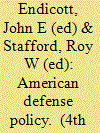|
|
|
Sort Order |
|
|
|
Items / Page
|
|
|
|
|
|
|
| Srl | Item |
| 1 |
ID:
038734


|
|
|
|
|
| Edition |
4th ed.
|
| Publication |
Baltimore, Johns Hopkins University Press, 1977.
|
| Description |
xii, 626p.
|
| Standard Number |
0801819601
|
|
|
|
|
|
|
|
|
|
|
|
Copies: C:1/I:0,R:0,Q:0
Circulation
| Accession# | Call# | Current Location | Status | Policy | Location |
| 017278 | 355.033573/EHD 017278 | Main | On Shelf | General | |
|
|
|
|
| 2 |
ID:
083349


|
|
|
|
|
| Publication |
2008.
|
| Summary/Abstract |
This paper focuses on the creation, development and current status of the concept of a "limited nuclear-weapon-free zone for Northeast Asia." While initial work was started in 1991 to develop a system to reinforce the South-North Korean nonaggression and denuclearization treaties, a more formal phase began in January 1995, when a panel of senior military officers met in Atlanta, Georgia. The original panel of general officer-rank specialists from China, Japan, South Korea, Russia and the United States grew in membership to eventually include Mongolia and North Korea, as well as observers from Argentina, Finland and France. The concept was refined in plenary meetings held in Buenos Aires; Bordeaux, France; Moscow; Helsinki; Tokyo; Seoul; Beijing; Ulaanbaatar, Mongolia; Jeju-do, South Korea; Shanghai and Tokyo. The 12th Plenary will be held in Daejeon, South Korea, in October 2008. While the concept of a limited nuclear-free zone has been developed, the international nonproliferation system has come under significant strain, as described in Paul Bracken's book, Fire in the East. Picking up on the theme introduced by Bracken that the world has entered the "second nuclear age," this paper argues that in light of the changed international environment, nuclear-free zones should be redefined and given new missions. Those new missions are to form the basis for new cooperative security systems in areas where regional security systems have yet to mature
|
|
|
|
|
|
|
|
|
|
|
|
|
|
|
|
|
|
|
|
|